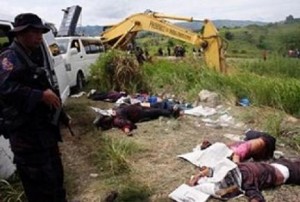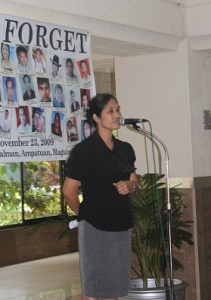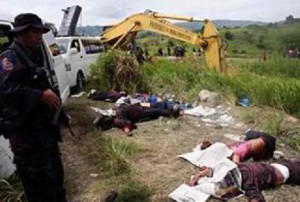By ARIEL C. SEBELLINO
 IT has been two years since a most heinous crime happened in the town of Ampatuan in Maguindanao province in Southern Philippines.
IT has been two years since a most heinous crime happened in the town of Ampatuan in Maguindanao province in Southern Philippines.
On Nov 23, 2009, 58 persons were killed, 32 of them journalists and media workers, earning for the Philippines the notorious tag as the second most dangerous place for media practitioners in the world, next only to Iraq.
Suspected perpetrators of the crime were members of the Ampatuan family, the political lords in the province.
Two years since that tragedy, 103 of the 196 suspects remain at large and only two of the principal suspects have been arraigned. The case remains snagged on hearings on petitions for bail of the accused.
The case has also been dragged into the electoral sabotage case of former President Gloria Arroyo with some of the major personalities involved in the massacre being tapped as witnesses in the highly-politicized court case.
Media organizations worldwide, led by the International Federation of Journalists (IFJ), have declared November 23 as the International Day to End Impunity. Several protest actions are planned to underscore the importance of keeping the alive the outrage against impunity that led to the Maguindanao massacre.
Veteran broadcast journalist Ed Lingao who was one of the first few journalists to visit the mass grave immediately after the incident, said that the massacre’s “enormity and savagery” will go down in history as the most brutal killing of journalists at one time.
 Editha Tiamzon, widow of the slain UNTV employee Daniel Tiamzon, does not want to go into the details of the carnage. “Sariwa pa rin sa akin ang masakit na pangyayari na yun. Maraming nawala sa amin. (It is still fresh in my mind. We lost a lot.),” she said.
Editha Tiamzon, widow of the slain UNTV employee Daniel Tiamzon, does not want to go into the details of the carnage. “Sariwa pa rin sa akin ang masakit na pangyayari na yun. Maraming nawala sa amin. (It is still fresh in my mind. We lost a lot.),” she said.
She would rather remember Daniel as a loving husband and a father to their three children always praying “that we will get justice someday.”
Tiamzon is one of the relatives of victims who filed Tuesday a P15 million civil suit against Arroyo claiming that by aiding and abetting the Ampatuans and by her refusal to ensure that the laws be faithfully executed in Maguindanao, Arroyo encouraged the culture of impunity perpetrated by the Ampatuans, leading to the Maguindanao massacre and causing damages to the heirs of the victims.
To help speed up the trial, Harry Roque, counsel for some of the victims of the massacre, has asked the Quezon City Regional Trial Court (RTC) to allow the resolution of individual cases against some of the suspects so that the murder charges against them could be resolved ahead of the others.
Senator Aquilino Martin “Koko” Pimentel III said he supports Roque’s plan.
This way, Pimentel said, the justice that the victims of the massacre have been denied in the past two years could start to be realized, beginning with the conviction of the alleged masterminds of the Maguindanao massacre.
Roque said that with 58 victims and almost 200 suspects in the massacre, the litigation for all the murder cases involved in the Maguindanao massacre case could take thousands of years citing the World Bank study that the average life span of a criminal case in the Philippines is five years.
“It would be absurd if we would have to wait for thousands of years. That would already amount to impunity. Putting priority on the conviction of the masterminds in the Maguindanao massacre case would therefore be the most logical way by which the victims could be served justice in our lifetime,” Pimentel said.
Despite the slowness of trial, Maguindanao governor Esmael “Toto” Mangudadatu, then vice mayor of Buluan, who lost his wife Genalyn and two sisters in the massacre, finds comfort in the “ awakening of the people.”
He said “people are now more vigilant and discerning of what’s going on.”
“Huwag nating tigilang pukawin ang gobyerno, hindi lang ang mga korte, (Let us not stop urging the government, not only the courts) to make justice efficient and sufficient,” Mangudadatu said.
He said he is holding on to the promise President Aquino made to them during their meeting last July that he will do “everything humanly possible” to secure justice for them.
